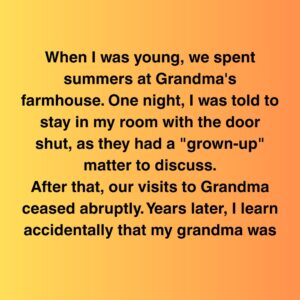They Forced Me and My Baby Granddaughter Out Into the Rain—But Justice Walked In
I never imagined my life would look like this at 72. When most people my age are slowing down and enjoying retirement, I’m raising a baby. My daughter Sarah was my miracle child. I had her late in life, at 40, after years of believing I would never become a mother. She was bright, kind, and compassionate—everything I could have hoped for. But life has a cruel way of rewriting plans. Last year, Sarah gave birth to her own daughter, Amy, and tragically, she didn’t survive the delivery.
Sarah never had the chance to hold her little girl. Her boyfriend couldn’t handle the responsibility and walked away soon after, leaving only a small monthly check that barely covers diapers. That left Amy with me, and though I am old and often exhausted, I could never turn my back on her. She’s my entire world now.
Yesterday was one of those days that stretched me thin. Amy had a pediatric appointment, and the waiting room was packed. By the time the doctor finally saw us, she was screaming uncontrollably, and my back ached from holding her. When we left the office, rain poured down in sheets, soaking everything. I spotted a small café across the street and hurried over, shielding Amy’s stroller with my jacket. All I wanted was to get out of the storm, sit down, and feed her.
The café smelled of cinnamon and coffee, a small comfort against the rain. I slid into a table near the window, parked the stroller beside me, and lifted Amy into my arms. Her cries pierced the air, but I whispered softly to calm her as I dug through my bag for her bottle. That’s when I felt the weight of someone’s stare.
A woman at the next table sneered and muttered just loud enough for me to hear, “This isn’t a daycare. Some of us come here to relax, not listen to that.”
My cheeks burned. Before I could respond, the man sitting with her leaned forward and added, “Yeah, maybe take your crying baby and leave. We’re paying customers, and no one wants to hear that.”
Their words sliced through me. I wanted to disappear, but where would I go? Back into the downpour with a hungry baby? I swallowed hard and said, “I’m not trying to cause trouble. I just need a place to feed her, out of the storm.”
The woman rolled her eyes. “You couldn’t do that in your car? Seriously, control your child or keep her home.”
The man nodded in agreement. “Step outside until she’s quiet.”
My hands shook as I tried to prepare Amy’s bottle, praying that once she was fed, they would stop. But before I could get the nipple into her mouth, a young waitress approached. Her voice was hesitant, but her words struck me like a blow. “Um, ma’am, maybe it would be better if you fed her outside? Some of the other customers are complaining.”
I couldn’t believe what I was hearing. I looked around the café, searching for even one sympathetic face, but most people avoided my eyes. A few were buried in their phones, pretending not to notice. It hit me then how much the world had changed. Once, we said “it takes a village.” Now, it seemed people would rather shut the door on a crying child than extend a hand.
“I will order something as soon as she’s fed,” I promised, my voice trembling.
Amy suddenly stopped fussing, her tiny eyes fixed on the entrance. She reached her hand out toward the door just as two police officers walked in, water dripping from their uniforms. The café went quiet.
The older officer stepped forward. “Ma’am, we were told you were disturbing customers. Is that true?”
My stomach dropped. “Someone called the police on me?”
The younger officer explained that the manager had flagged them down outside. The waitress quickly backed up his claim, saying I refused to leave. I shook my head, desperate to defend myself. “All I did was come in to feed my granddaughter. She was crying, but I was calming her down. I never refused to leave—I just needed a moment.”
The older officer raised an eyebrow. “So the disturbance is… a hungry baby?”
I nodded.
Before I could say more, Amy started fussing again. That’s when the younger officer smiled and said, “May I?” He held out his arms, explaining that he had nieces and nephews and knew how to handle babies. I hesitated, then handed her over. To my amazement, Amy settled in his arms almost instantly, drinking her bottle in peace.
“Disturbance solved,” the older officer said dryly, glancing at the red-faced manager. Then he turned to the waitress. “Bring us three coffees and three slices of apple pie with ice cream. We’ll be sitting with this lady.”
The manager sputtered in protest, but the officers ignored him. The waitress, looking almost relieved, hurried off. For the next half hour, the three of us sat together. They introduced themselves as Christopher and Alexander, listened as I told them about raising Amy, and reassured me that I’d done nothing wrong. They even paid for our food before leaving.
Three days later, I learned that Alexander had sent a photo of me and Amy to his sister—a journalist. The story spread online and in local papers, casting light on how cruelly we had been treated. The café’s owners quickly fired the manager, and when I passed by a week later, I saw a new sign at the door: “Babies Welcome. No Purchase Necessary.”
The same waitress spotted me and waved me inside. “Order anything you’d like. It’s on the house,” she said with a smile.
I chose pie and ice cream again, leaving her a generous tip. As I watched Amy gurgle happily in her stroller, I realized something important. Kindness still exists. Sometimes, it just walks in when you least expect it—often in uniform, with a slice of pie.





